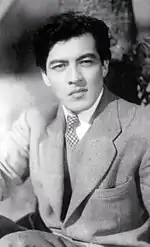Rentarō Mikuni | |
|---|---|
 Mikuni in the 1950s | |
| Born | Masao Sato 20 January 1923 |
| Died | 14 April 2013 (aged 90) |
| Occupation | Actor |
| Years active | 1950–2013 |
| Children | Kōichi Satō |
| Relatives | Kani'chiro Sato (grandson) |
Rentarō Mikuni (三國連太郎, Mikuni Rentarō, 20 January 1923 – 14 April 2013) was a Japanese actor, writer and director, who starred in films of Keisuke Kinoshita, Mikio Naruse, Tadashi Imai, Shōhei Imamura, Tomu Uchida and many others.[1][2] He received numerous prizes for his performances[3] and was awarded the Jury Prize at the 1987 Cannes Film Festival for his film Shinran: Path to Purity, which he wrote and directed.[4]
Biography
Mikuni was born Masao Sato in Ōta, Gunma Prefecture, and grew up in Nishiizu, Shizuoka Prefecture, the hometown of his adoptive father.[3] After dropping out of Toyo Junior High School in Shimoda, he led a wandering life between Japan, China and Korea (then under Japanese control).[3]
At the age of twenty, Mikuni received call-up papers for the Japanese military.[3] In his autobiography and in interviews Mikuni claimed that he tried to escape the draft as he didn't want to die or kill people, but was caught after his mother had informed the police for fear of ostracism.[5][6] He was sent to the Chinese front, fell ill, served his time in a unit of unfit and incompetent soldiers, and never fired a weapon at the enemy.[5][6]
After returning to Japan, he worked in a variety of jobs.[3] His career as an actor started when he participated in a newcomer contest by the Shochiku film studio in 1950, although he originally had no intention of becoming an actor.[1][5] He gave his debut in Keisuke Kinoshita's The Good Fairy (1951), for which he received the Blue Ribbon Award for best newcomer, and took his stage name from the character he played in the film.[3][7]
Notable appearances in the following years include The Burmese Harp (1956), Stepbrothers (1957), Night Drum (1958), A Fugitive from the Past (1965), Vengeance is Mine (1979) and the popular Tsuribaka Nisshi series.[3][8][9] In 1972, Mikuni started shooting a film in Afghanistan under his direction which remained unfinished.[10]
Mikuni died in Tokyo on 14 April 2013 of acute cardiac failure.[7] He is the father of actor Kōichi Satō.[3]
Filmography (selected)
Film
- The Good Fairy (1951)
- Husband and Wife (1953)
- Samurai I : Musashi Miyamoto (1954)
- Keisatsu nikki (1955)
- A Hole of My Own Making (1955)
- The Burmese Harp (1956)
- Ryūri no Kishi (1956)
- Stepbrothers (1957)
- Night Drum (1958)
- Ballad of the Cart (1959)
- Kiku to Isamu (1959)
- The Catch (1961)
- Harakiri (1962) as Saitō Kageyu
- Wolves, Pigs and Men (1964)
- Kwaidan (1965)
- A Fugitive from the Past (1965)
- The Threat (1966) as Misawa
- Zatoichi the Outlaw (1967)
- The Profound Desire of the Gods (1968)
- Tabi no Omosa (1972)
- Coup d'État (1973) as Ikki Kita
- Himiko (1974)
- Kiri-no-hata (1977)
- Mount Hakkoda (1977)
- Never Give Up (1978)
- Vengeance is Mine (1979)
- Ah! Nomugi Toge (1979)
- Sailor Suit and Machine Gun (1981)
- The Go Masters (1983)
- A Promise (1986)
- Shinran: Path to Purity (director, 1987)
- A Taxing Woman's Return (1988)
- Tsuribaka Nisshi (1988)
- Wuthering Heights (1988)
- Rikyu (1989) as Sen no Rikyū
- Tsuribaka Nisshi 2 (1989)
- Tsuribaka Nisshi 3 (1990)
- Tsuribaka Nisshi 4 (1991)
- Musuko (1991)
- Luminous Moss (1992)
- Tsuribaka Nisshi 6 (1993)
- Daibyonin (1993)
- Tsuribaka Nisshi 7 (1994)
- Mitabi no kaikyô (1995)
- Oishinbo (1996) as Yūzan Kaibara
- Will to Live (1999)
- Taiga no itteki (2001)
- The Wind Carpet (2003)
- Chronicle of My Mother (2012)
Television
- Hissatsu Shikakenin (1972) – episode 6
- Akai unmei (1976)
- Sekigahara (1981) – Honda Masanobu
Honours and awards (selected)
- Blue Ribbon Award for Best Actor in 1960[11] and in 1989[12]
- Kinema Junpo Award for Best Actor in 1965, 1989 and 1991
- Mainichi Film Award for Best Actor in 1965,[13] 1974[14] and 1989[15]
- Medal with Purple Ribbon (1984)[3]
- Order of the Rising Sun, 4th Class, Gold Rays with Rosette (1993)[3]
References
- 1 2 "三國連太郎". Kinenote (in Japanese). Retrieved 10 July 2023.
- ↑ "三國連太郎". Japanese Movie Database (in Japanese). Retrieved 10 July 2023.
- 1 2 3 4 5 6 7 8 9 10 "三國連太郎". Kotobank (in Japanese). Retrieved 10 July 2023.
- ↑ "Shinran: Shiroi michi". Festival de Cannes. Retrieved 10 July 2023.
- 1 2 3 Mikuni, Rentarō. Ikizama Shinizama [Way of life, way of death]. ISBN 4-8454-2071-6.
- 1 2 "<平和と民主主義>三國連太郎さん「人を殺すのがいやだった」=1999年8月". Mainichi (in Japanese). 13 August 1999. Retrieved 10 July 2023.
- 1 2 "Rentaro Mikuni, movie actor and director, dies at 90". The Japan Times. 16 April 2013. Retrieved 10 July 2023.
- ↑ Anderson, Joseph L.; Richie, Donald (1959). The Japanese Film – Art & Industry. Rutland, Vermont and Tokyo: Charles E. Tuttle Company.
- ↑ "三國連太郎". NHK (in Japanese). Retrieved 11 July 2023.
- ↑ "Mikuni documentary brings actor full circle". The Japan Times. 6 September 2009. Retrieved 11 July 2023.
- ↑ ブルーリボン賞ヒストリー (in Japanese). Cinema Hochi. Archived from the original on 2 February 2010. Retrieved 8 April 2010.
- ↑ ブルーリボン賞ヒストリー (in Japanese). Cinema Hochi. Archived from the original on 7 February 2009. Retrieved 8 April 2010.
- ↑ "毎日映画コンクール 第20回(1965年)". Mainichi (in Japanese). Retrieved 10 July 2023.
- ↑ "毎日映画コンクール 第29回(1974年)". Mainichi (in Japanese). Retrieved 10 July 2023.
- ↑ "毎日映画コンクール 第44回(1989年)". Mainichi (in Japanese). Retrieved 10 July 2023.